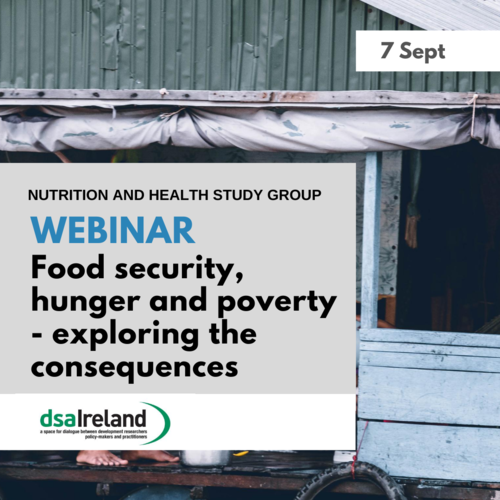When: 12 noon Monday 7th September
Registration: Register in advance here.
This webinar hosted by the DSAI Nutrition and Health Study Group will consider the theme of food security, hunger and poverty, exploring the consequences through the fabrics of social, political and planetary health on the backdrop of the COVID-19 pandemic.
Preliminary projections suggest that the COVID-19 pandemic may add an additional 83 to 132 million people to the ranks of the undernourished in 2020. Asia is home to more than half of the total undernourished people in the world – an estimated 381 million people in 2019 and almost a third (31.6%) of India’s population suffered from moderate or severe food insecurity in 2017-19. Latin America and the Caribbean is expected to register an alarming 269 percent rise in the number of people facing severe food insecurity when compared to 2019 – the highest relative increase globally. This Webinar which brings together speakers from Brazil, Ireland and India is the start of a conversation exploring the challenges of food insecurity, hunger, poverty and the implications of planetary health in both Brazil and India. The conversation and concepts will be further explored by Civil Society Study Group webinar on 17th September 2020.
In operationalizing constitutional guarantees to food security and health, there is no one-size-fits-all solution for countries. Policies need to be context-specific, overcoming barriers, and accounting for political, social and health infrastructure and systems. In Brazil and India constitutionalized rights are challenged when existing systems fail to deliver on basic needs, placing the most vulnerable (the poor, indigenous people) in a precarious situation with increased hunger, poor health and increased risk of mortality. Necropolitics as a concept is addressed where food security cannot be attempted without addressing human security threats which are vital to the core of human existence. We advance the proposal for rethinking food security by reframing food security as the joint struggle for the right to adequate food and planetary health.
Speakers:
Mayara Floss is family medicine resident in Porto Alegre - Brazil. She is member of the Rural WONCA Executive and WONCA Environment. In 2020 she launched under her coordination the Brazilian MOCC on Planetary Health. Rural Seeds creator and ambassador. Junior author of the Brazilian Lancet Countdown Policy Brief. Member of the evidence review team and the guideline development group of WHO on Health Workforce attraction, recruitment and retention in rural and remote areas. Podcaster at the Medicina em Debate Program. Audivsual producer of Seriie SUS. Musician at Projeto M(Ar) and a writer .
Ruchi Junnarkar is a development practitioner working on nutrition, health and gender in India. Her research focuses on the role and constraints of frontline workers in the implementation of social policy. She has previously worked with the Centre for Policy Research, New Delhi, and studied International Development at the London of School of Economics.
Su-ming Khoo is a Lecturer in Political Science and Sociology, and leads the Environment, Development and Sustainability (Whitaker Institute) and Socio-Economic Impact (Ryan Institute) Research Clusters at NUI Galway. Her research is on human rights, human development, public goods, development alternatives, decoloniality, global activism, and higher education.
Topics for Discussion:
Our speakers will be invited to address the following key questions:
- Prior to COVID-19 what are the greatest threats to the rights of the poor and indigenous groups and most vulnerable in society to achieving their constitutional right to food/nutrition/health and how has this changed on the background of COVID-19?
- What can grassroots groups/NGO’s/ international organizations and government systems do to respond to the sharp rise in food insecurity in the wake of COVID-19, and ensure the most vulnerable communities have access to adequate support?
- Planetary health and the complex interaction of SDG 2(Hunger) SDG 3 (Health) and SDG 13 (climate-related). How can the narrative change in tackling food insecurities and reducing the environmental and health costs for individuals and society as a whole?
